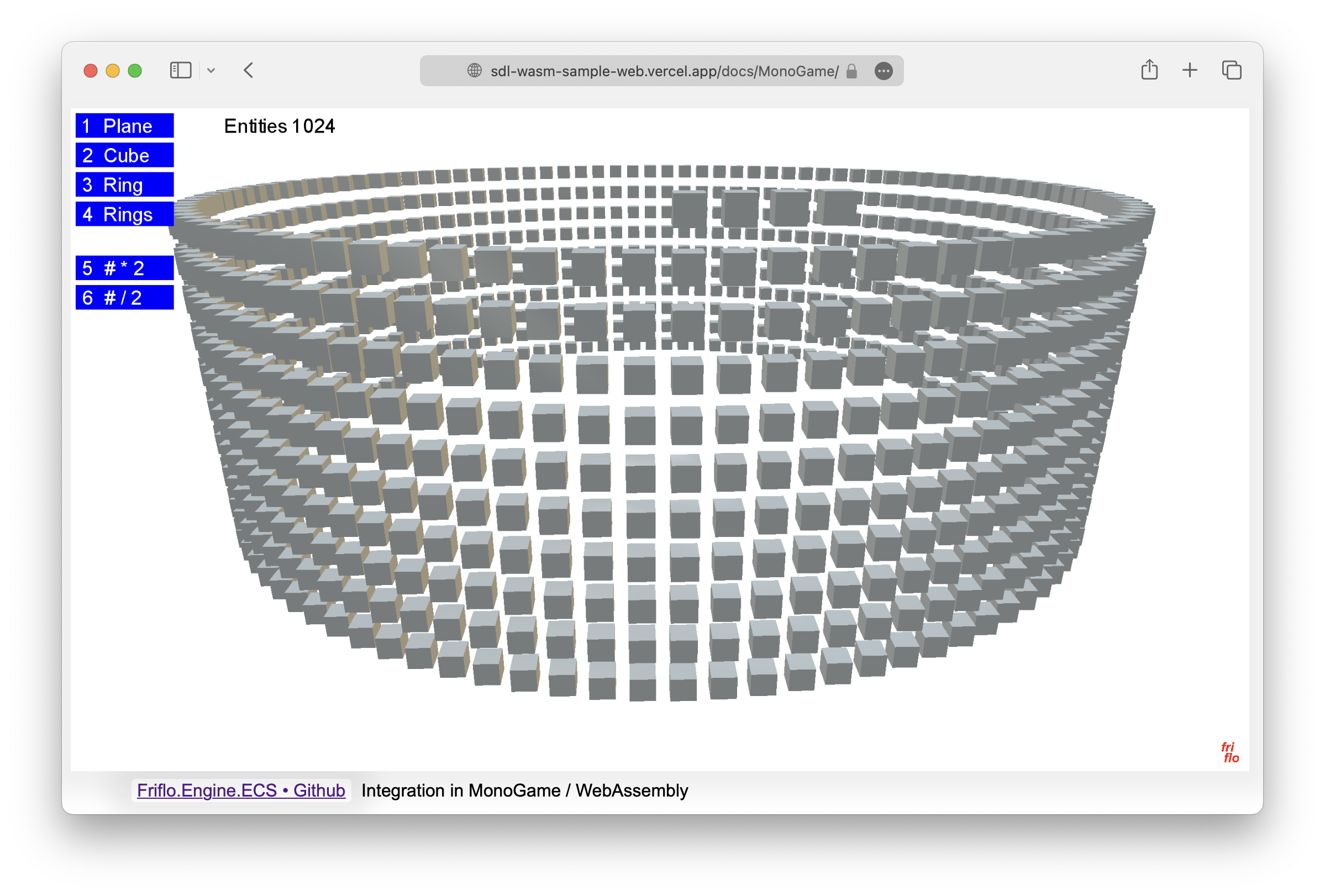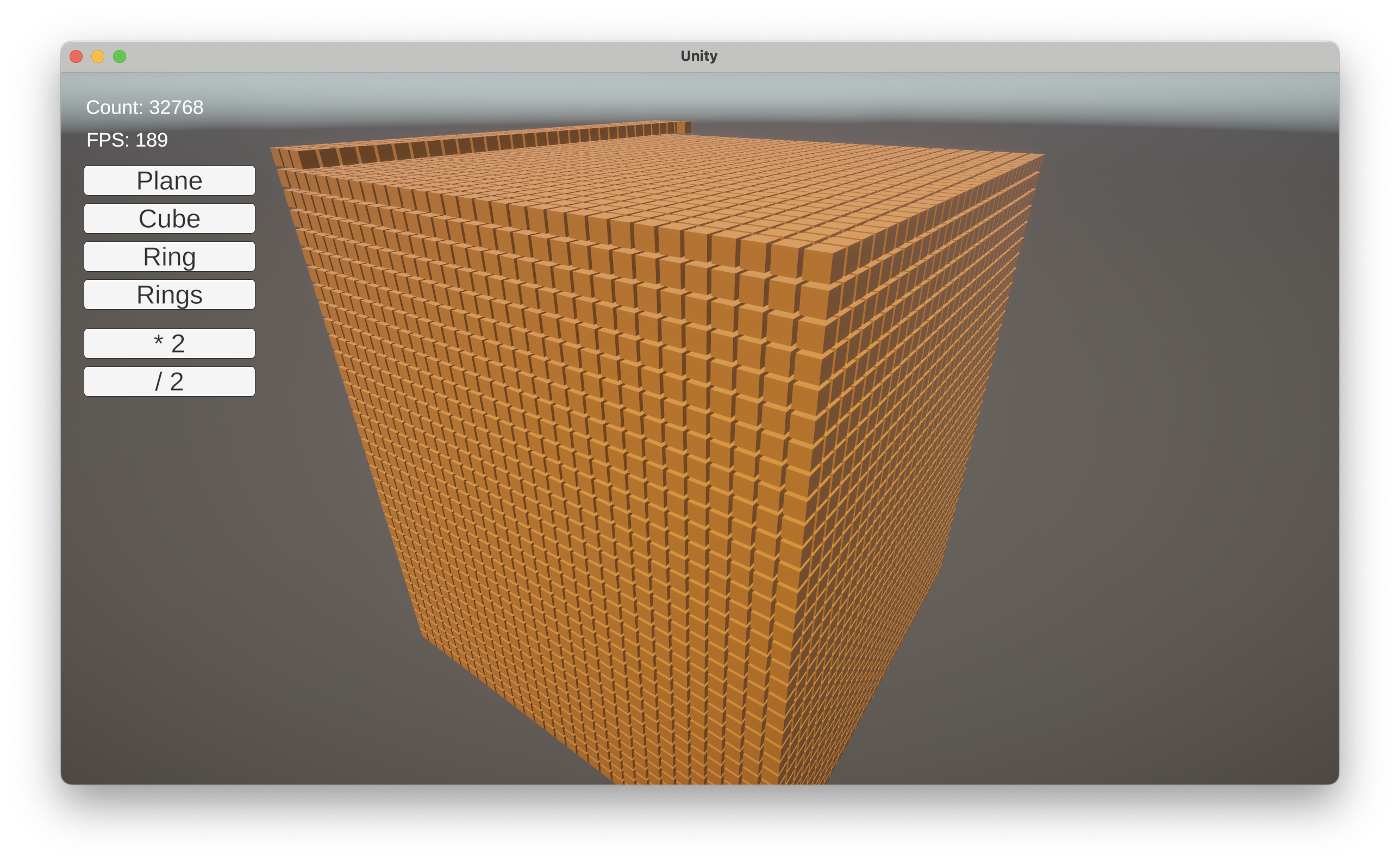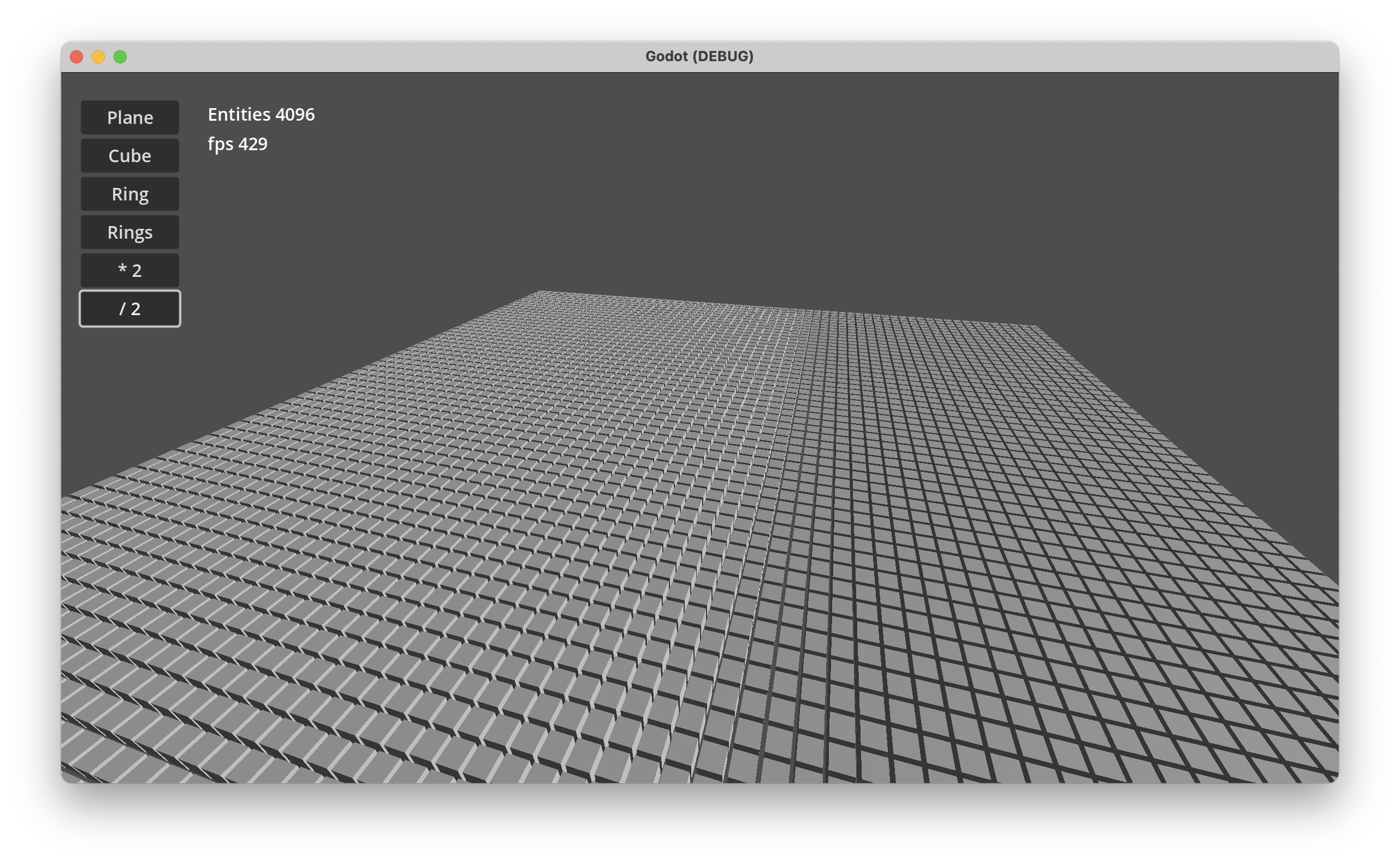Currently fastest 🔥 ECS implementation in C# / .NET - using Ecs.CSharp.Benchmark as reference.
See benchmark results - Mac Mini M2 - at the bottom of this page.
This ECS is an Archetype / AoS based Entity Component System. See: ECS - Wikipedia.
Feature highlights
- Simple API.
- High-performance 🔥 and compact ECS implementation - Friflo.Engine.ECS.dll size 250 KB
- Subscribe events of specific or all entities.
- JSON Serialization.
- SIMD Support - optional. Multi thread capable and remainder loop free.
- Supports .NET Standard 2.1 .NET 5 .NET 6 .NET 7 .NET 8
WASM / WebAssembly, Unity (Mono & AOT/IL2CPP), Godot and MonoGame. - No use of unsafe code. See Wiki ⋅ Library.
Complete feature list at Wiki ⋅ Features.
Get package on nuget or use the dotnet CLI.
dotnet add package Friflo.Engine.ECS
Interactive Browser Demo showing MonoGame WebAssembly integration. Try online Demo.



Note: WebGL has currently poor render performance.
Desktop performance of Demos: Godot 202 FPS, Unity 100 FPS at 65536 entities.
Example Demos for Windows, macOS & Linux available as projects for Godot, MonoGame and Unity.
See Demos · GitHub
This section contains two typical use cases when using an ECS.
More examples are in the GitHub Wiki.
Examples - General
Explain fundamental ECS types like Entity, Component, Tag, Command Buffer, ... and how to use them.
Examples - Optimization
Provide techniques how to improve ECS performance.
The hello world examples demonstrates the creation of a world, some entities with components
and their movement using a simple ForEachEntity() call.
public struct Velocity : IComponent { public Vector3 value; }
public static void HelloWorld()
{
var world = new EntityStore();
for (int n = 0; n < 10; n++) {
world.CreateEntity(new Position(n, 0, 0), new Velocity{ value = new Vector3(0, n, 0)});
}
var query = world.Query<Position, Velocity>();
query.ForEachEntity((ref Position position, ref Velocity velocity, Entity entity) => {
position.value += velocity.value;
});
}In case of moving (updating) thousands or millions of entities an optimized approach can be used.
See:
Enumerate Query Chunks,
Parallel Query Job and
Query Vectorization - SIMD.
All query optimizations are using the same query but with different enumeration techniques.
Systems are new in Friflo.Engine.ECS v2
Systems in ECS are typically queries.
So you can still use the world.Query<Position, Velocity>() shown in the "Hello World" example.
Using Systems is optional but they have some significant advantages:
-
It enables chaining multiple decoupled QuerySystem classes.
-
System fields can be used as parameters in
OnUpdate(). -
Each system is added to a SystemGroup. SystemRoot is also a SystemGroup.
Each group provide a CommandBuffer. -
Systems have performance monitoring build-in. If enabled systems detected as bottleneck can be optimized.
-
Multiple worlds can be added to a single SystemRoot instance.
root.Update()will execute every system on all worlds.
public static void HelloSystem()
{
var world = new EntityStore();
for (int n = 0; n < 10; n++) {
world.CreateEntity(new Position(n, 0, 0), new Velocity(), new Scale3());
}
var root = new SystemRoot(world) {
new MoveSystem(),
// new PulseSystem(),
// new ... multiple systems can be added. The execution order still remains clear.
};
root.Update(default);
}
class MoveSystem : QuerySystem<Position, Velocity>
{
protected override void OnUpdate() {
Query.ForEachEntity((ref Position position, ref Velocity velocity, Entity entity) => {
position.value += velocity.value;
});
}
}A valuable strength of an ECS is establishing a clear and decoupled code structure.
Adding the PulseSystem below to the SystemRoot above is trivial.
class PulseSystem : QuerySystem<Scale3>
{
float frequency = 4f;
protected override void OnUpdate() {
Query.ForEachEntity((ref Scale3 scale, Entity entity) => {
scale.value = Vector3.One * (1 + 0.2f * MathF.Sin(frequency * Tick.time));
});
}
}The GitHub Wiki provide you detailed information about the ECS and illustrate them by examples.
-
Examples - General
Explain fundamental ECS types like Entity, Component, Tag, Command Buffer, ... and show you how to use them. -
Examples - Optimization
Provide you techniques how to improve ECS performance. -
Extensions
Projects extending Friflo.Engine.ECS with additional features. -
Features
Integration possibilities, a complete feature list and performance characteristics 🔥. -
Library
List supported platforms, properties of the assembly dll and build statistics. -
Release Notes
List of changes of every release available on nuget.
Two benchmarks - subset of Ecs.CSharp.Benchmark - 2024-02-16 running on a Mac Mini M2.
Made a subset as the other benchmarks are similar only with different parameters.
- Create 100.000 entities with three components
- Update 100.000 entities with two components
| Method | Mean | Error | StdDev | Gen0 | Gen1 | Gen2 | Allocated | |
|---|---|---|---|---|---|---|---|---|
| Arch | 2.411 ms | 0.0370 ms | 0.0657 ms | - | - | - | 3948.49 KB | |
| SveltoECS | 28.246 ms | 0.5175 ms | 0.4840 ms | - | - | - | 4.97 KB | |
| DefaultEcs | 5.931 ms | 0.1179 ms | 0.2685 ms | 2000.0000 | 2000.0000 | 2000.0000 | 19526.04 KB | |
| FlecsNet | 14.896 ms | 0.1574 ms | 0.1229 ms | - | - | - | 3.81 KB | |
| FrifloEngineEcs | 🔥 | 1.293 ms | 0.0116 ms | 0.0097 ms | 1000.0000 | 1000.0000 | 1000.0000 | 6758.76 KB |
| HypEcs | 22.243 ms | 0.1328 ms | 0.1178 ms | 8000.0000 | 3000.0000 | 3000.0000 | 68762.52 KB | |
| LeopotamEcsLite | 2.646 ms | 0.0520 ms | 0.0884 ms | 2000.0000 | 2000.0000 | 2000.0000 | 11253.58 KB | |
| LeopotamEcs | 7.944 ms | 0.1398 ms | 0.1554 ms | 2000.0000 | 2000.0000 | 2000.0000 | 15741.98 KB | |
| MonoGameExtended | 25.024 ms | 0.0763 ms | 0.1232 ms | 4000.0000 | 3000.0000 | 3000.0000 | 30162.07 KB | |
| Morpeh_Direct | 90.162 ms | 0.2032 ms | 0.1801 ms | 9000.0000 | 5000.0000 | 2000.0000 | 83805.52 KB | |
| Morpeh_Stash | 30.655 ms | 0.3532 ms | 0.3131 ms | 4000.0000 | 2000.0000 | 1000.0000 | 44720.38 KB | |
| RelEcs | 56.156 ms | 0.4419 ms | 0.4134 ms | 9000.0000 | 4000.0000 | 3000.0000 | 75714.03 KB |
🔥 library of this project
Benchmark parameter: Padding = 0
Notable fact
SIMD MonoThread running on a single core beats MultiThread running on 8 cores.
So other threads can still keep running without competing for CPU resources.
| Method | Mean | Error | StdDev | Median | Gen0 | Allocated | |
|---|---|---|---|---|---|---|---|
| Arch_MonoThread | 62.29 μs | 0.039 μs | 0.031 μs | 62.29 μs | - | - | |
| Arch_MultiThread | 48.13 μs | 0.345 μs | 0.322 μs | 48.23 μs | - | - | |
| DefaultEcs_MonoThread | 125.48 μs | 0.507 μs | 0.450 μs | 125.58 μs | - | - | |
| DefaultEcs_MultiThread | 127.47 μs | 1.242 μs | 1.101 μs | 127.46 μs | - | - | |
| FrifloEngineEcs_MonoThread | 🔥 | 55.57 μs | 0.699 μs | 0.654 μs | 55.57 μs | - | - |
| FrifloEngineEcs_MultiThread | 🔥 | 15.96 μs | 0.316 μs | 0.295 μs | 15.94 μs | - | - |
| FrifloEngineEcs_SIMD_MonoThread | 🔥 | 11.94 μs | 0.012 μs | 0.011 μs | 11.94 μs | - | - |
| HypEcs_MonoThread | 56.30 μs | 0.050 μs | 0.042 μs | 56.31 μs | - | 112 B | |
| HypEcs_MultiThread | 62.30 μs | 0.031 μs | 0.027 μs | 62.30 μs | 0.2441 | 2081 B | |
| LeopotamEcsLite | 143.43 μs | 0.063 μs | 0.056 μs | 143.45 μs | - | - | |
| LeopotamEcs | 136.52 μs | 0.071 μs | 0.066 μs | 136.54 μs | - | - | |
| MonoGameExtended | 464.74 μs | 0.631 μs | 0.590 μs | 465.01 μs | - | 161 B | |
| Morpeh_Direct | 1,394.87 μs | 26.879 μs | 27.603 μs | 1,396.43 μs | - | 2 B | |
| Morpeh_Stash | 1,074.20 μs | 21.396 μs | 58.570 μs | 1,053.22 μs | - | 2 B | |
| RelEcs | 249.37 μs | 0.882 μs | 0.825 μs | 249.44 μs | - | 169 B | |
| SveltoECS | 162.80 μs | 0.688 μs | 0.643 μs | 162.45 μs | - | - |
🔥 library of this project
This project is licensed under LGPLv3.
Friflo.Engine.ECS
Copyright © 2024 Ullrich Praetz - https://github.com/friflo









